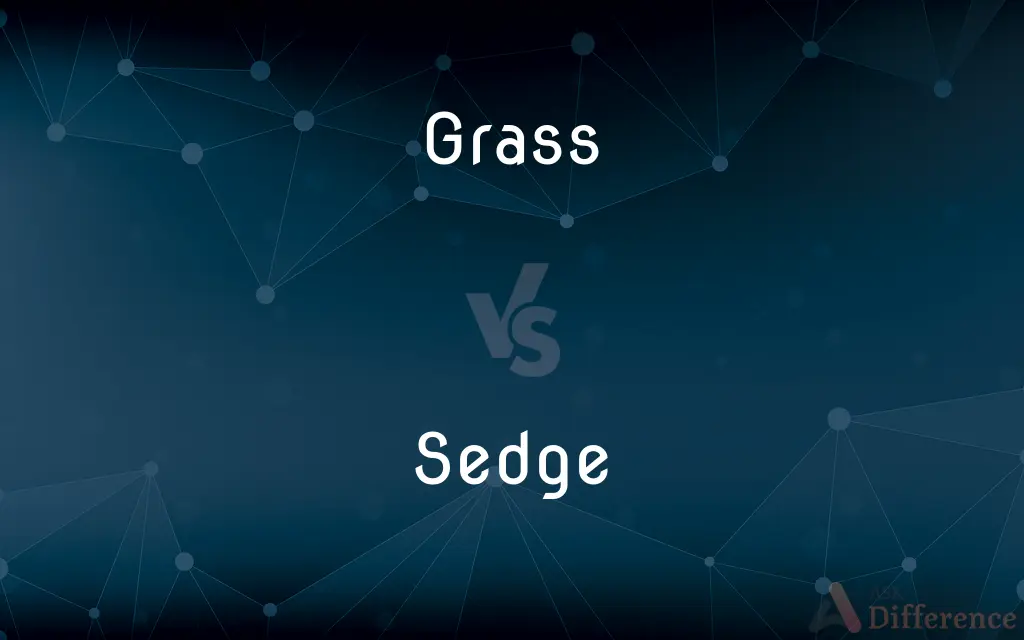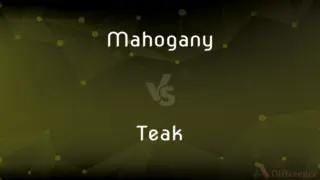Grass vs. Sedge — What's the Difference?
By Tayyaba Rehman — Updated on October 31, 2023
Grass has jointed, hollow stems and narrow leaves, common in lawns; sedge has solid, triangular stems, and often thrives in moist areas.

Difference Between Grass and Sedge
Table of Contents
ADVERTISEMENT
Key Differences
Grass, found in lawns and fields, has hollow, cylindrical stems, while sedge stems are solid and often triangular in cross-section.
Sedge often grows in wet environments, like marshes, contrasting with the wide range of habitats where grass thrives.
Grass leaves are usually narrow and flat; sedge leaves are stiffer and more angular, sometimes forming a V shape.
In terms of reproduction, grasses generally have feathery flowers, while sedges produce more compact, spiky inflorescences.
Maintenance-wise, grass often needs regular mowing in lawns; sedges can be low-maintenance, especially in natural settings.
ADVERTISEMENT
Comparison Chart
Stem Structure
Hollow and cylindrical
Solid and triangular
Preferred Habitat
Various, including lawns
Often moist areas, like marshes
Leaf Shape
Narrow and flat
Stiff, angular, V-shaped
Flower Type
Feathery
Compact and spiky
Maintenance
Requires mowing in lawns
Generally low-maintenance
Compare with Definitions
Grass
Part of the Poaceae family.
Wheat is a type of grass.
Sedge
Produces compact, spiky flowers.
The sedge bloomed in spring.
Grass
A member of the grass family.
Sedge
Part of the Cyperaceae family.
Many sedge species are used in landscaping.
Grass
The members of the grass family considered as a group.
Sedge
Commonly found in wet areas.
The marsh was full of sedge.
Grass
Any of various plants having slender leaves similar to those of a grass.
Sedge
A plant with solid, often triangular stems.
Sedge thrived near the pond.
Grass
Ground, as on a lawn, that is covered with grass or similar plants.
Sedge
Has stiff, angular leaves.
The sedge leaves were sharp.
Grass
Grazing land; pasture.
Sedge
Any of numerous grasslike plants of the family Cyperaceae, characteristically having solid three-sided stems, leaves arranged in three rows, and spikelets of inconspicuous flowers.
Grass
(Slang) Marijuana.
Sedge
Any plant of the genus Carex, the true sedge, perennial, endogenous herbs, often growing in dense tufts in marshy places. They have triangular jointless stems, a spiked inflorescence, and long grasslike leaves which are usually rough on the margins and midrib. There are several hundred species.
Grass
(Electronics) Small variations in amplitude of an oscilloscope display caused by electrical noise.
Sedge
Any plant of the family Cyperaceae.
Grass
Chiefly British Slang An informer.
Sedge
Any of certain other plants resembling sedges, such as Gentiana rubricaulis and Andropogon virginicus.
Grass
To cover with grass.
Sedge
(fishing) A dry fly used in fly fishing, designed to resemble a sedge or caddis fly.
Grass
To grow grass on.
Sedge
Obsolete spelling of siege
Grass
To feed (livestock) with grass.
Sedge
A flock of herons, cranes, or bitterns.
Grass
To become covered with grass.
Sedge
Any plant of the genus Carex, perennial, endogenous, innutritious herbs, often growing in dense tufts in marshy places. They have triangular jointless stems, a spiked inflorescence, and long grasslike leaves which are usually rough on the margins and midrib. There are several hundred species.
Grass
To graze.
Sedge
A flock of herons.
Grass
Any plant of the family Poaceae, characterized by leaves that arise from nodes in the stem and leaf bases that wrap around the stem, especially those grown as ground cover rather than for grain.
Sedge
Grasslike or rushlike plant growing in wet places having solid stems, narrow grasslike leaves and spikelets of inconspicuous flowers
Grass
(countable) Various plants not in family Poaceae that resemble grasses.
Grass
(uncountable) A lawn.
Grass
Marijuana.
Grass
An informer, police informer; one who betrays a group (of criminals, etc) to the authorities.
What just happened must remain secret. Don't be a grass.
Grass
Sharp, closely spaced discontinuities in the trace of a cathode-ray tube, produced by random interference.
Grass
Noise on an A-scope or similar type of radar display.
Grass
The season of fresh grass; spring or summer.
Grass
That which is transitory.
Grass
Asparagus; "sparrowgrass".
Grass
(mining) The surface of a mine.
Grass
(transitive) To lay out on the grass; to knock down (an opponent etc.).
Grass
To act as a grass or informer, to betray; to report on (criminals etc) to the authorities.
Thesaurus:rat out
Grass
(transitive) To cover with grass or with turf.
Grass
(transitive) To feed with grass.
Grass
(transitive) To expose, as flax, on the grass for bleaching, etc.
Grass
(transitive) To bring to the grass or ground; to land.
Grass
Popularly: Herbage; the plants which constitute the food of cattle and other beasts; pasture.
Grass
An endogenous plant having simple leaves, a stem generally jointed and tubular, the husks or glumes in pairs, and the seed single.
Grass
The season of fresh grass; spring.
Two years old next grass.
Grass
Metaphorically used for what is transitory.
Surely the people is grass.
Grass
Marijuana.
Grass
To cover with grass or with turf.
Grass
To expose, as flax, on the grass for bleaching, etc.
Grass
To bring to the grass or ground; to land; as, to grass a fish.
Grass
To produce grass.
Grass
Narrow-leaved green herbage: grown as lawns; used as pasture for grazing animals; cut and dried as hay
Grass
German writer of novels and poetry and plays (born 1927)
Grass
Animal food for browsing or grazing
Grass
Street names for marijuana
Grass
Shoot down, of birds
Grass
Cover with grass;
The owners decided to grass their property
Grass
Spread out clothes on the grass to let it dry and bleach
Grass
Cover with grass
Grass
Feed with grass
Grass
Give away information about somebody;
He told on his classmate who had cheated on the exam
Grass
A common plant with jointed stems and narrow leaves.
The grass needs mowing.
Grass
Used for lawns and grazing.
Cows grazed on the grass.
Grass
Grows in a wide range of habitats.
Grass covered the hillside.
Grass
Often needs regular care in gardens.
He watered the grass daily.
Common Curiosities
Can sedge grow in dry conditions?
Some species can, but they prefer moisture.
Is sedge easy to maintain?
Generally, it requires less maintenance.
Can grass grow in shade?
Some species are shade-tolerant.
Are all grasses good for lawns?
No, some are better suited than others.
Do grasses need fertilizing?
Some types benefit from it.
What is grass commonly used for?
Lawns, pastures, and some grains.
Is grass edible for humans?
Some grains, like wheat, are edible.
Can grass be used for erosion control?
Yes, it's effective in many cases.
How often should grass be watered?
Depends on type and climate.
Can sedge be invasive?
Some species can be aggressive.
Are sedges ever used in gardens?
Yes, for texture and wet area planting.
Are there flowering sedges?
Yes, they produce distinctive flowers.
Is grass ever used for thatching roofs?
Yes, in some traditional practices.
Does sedge provide habitat for wildlife?
Yes, especially in wetlands.
Do sedges have any medicinal uses?
Some have been used traditionally.
Share Your Discovery

Previous Comparison
Paleontologist vs. Archaeologist
Next Comparison
Mahogany vs. TeakAuthor Spotlight
Written by
Tayyaba RehmanTayyaba Rehman is a distinguished writer, currently serving as a primary contributor to askdifference.com. As a researcher in semantics and etymology, Tayyaba's passion for the complexity of languages and their distinctions has found a perfect home on the platform. Tayyaba delves into the intricacies of language, distinguishing between commonly confused words and phrases, thereby providing clarity for readers worldwide.
















































